On Saturday, May 9 Senator Marco Rubio, a Presidential candidate, said to a South Carolina audience “When people ask what our strategy should be on global jihadists and terrorists, I refer them to the movie, ‘Taken’,” Have you seen the movie ‘Taken’? Liam Neeson, he has a line — this is what our strategy should be: We will look for you, we will find you, and we will kill you.”*
Mr. Rubio’s threat is theatrical. It implies the possession of a personal ferocity — “Look how steadfast and dangerous I might be.” His language is meant to show him inhabiting the imagined swagger of a movie warrior; he hopes the image will transfer to him.
Mr. Rubio, of course, will kill no one, nor will any of the other plump white men running for the Republican nomination or Mrs. Clinton, should she make an equally loathsome claim — none of them would know how to break up a high school fight let alone kill an armed, trained enemy combatant.
On Memorial Day we should remember the honorable ones, the men and women who stepped away from the soft, accustomed pleasures of the consumer life and carried a rifle or who carry it still, who went down to the sea, or who dwell there still, who flew away in helicopters and fighters, or who rise up even at this moment off carriers or from sand-crusted flatlands, and who by their actions tell us, and told us, that they would give up their time and their bodies and their lives if necessary so that we might sleep years more in the fat oblivion of our virtual worlds. If nothing else, we owe it to them to try to imagine what they saw and felt and what they endured … and what they still endure.
We owe it to them to accept the reality of their experiences. These were not movies:
Elmer Bendiner operated a .50 caliber machine gun and navigated a B-17 over Germany. Sometime after he returned he wrote The Fall of Fortresses from which this excerpt is taken:
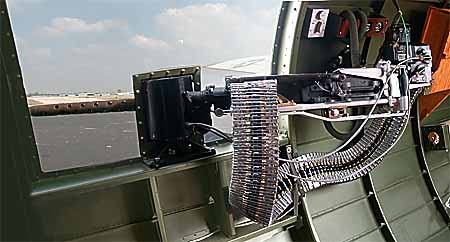 A squawk from someone: ‘Fighters at nine o’clock.’ I rested my gun on the desk to note developments and saw that [it] was making a grease puddle on the log and the maps. The word ‘fighters’ scrawled its way through the stain.
A squawk from someone: ‘Fighters at nine o’clock.’ I rested my gun on the desk to note developments and saw that [it] was making a grease puddle on the log and the maps. The word ‘fighters’ scrawled its way through the stain.
B-17 waist gun
The convulsion of the turret gun blasting over my head filled the nose. … The fighters coming in were each an inch of silver against the blue. They came in three abreast at eleven o’clock. … The wings grew to two or three inches and touched off little sparklers. Then they were no longer inches but massive aircraft, flipping over, spitting, and sliding down out of my gun sights, like gulls gliding down currents of air to the dull metallic sheen of the distant earth. … Those unreal fighters, beautiful as swift arrows….
Tim O’Brien carried a rifle in Vietnam in 1969-1970. Sometime after he returned he wrote this, from the story The Things They Carried:
But Ted Lavender, who was scared, carried 34 rounds when he was shot outside Than Khe, and he went down under an exceptional burden, more than 20 pounds of ammunition, plus the flak jacket and helmet and rations and water and toilet paper and tranquilizers and all the rest, plus the unweighed fear. He was dead weight. There was no twitching or flopping. Kiowa, who saw it happen, said it was like watching a rock fall, or a big sandbag or something — just boom, then down — not like the movies where the dead guy rolls around and does fancy spins and goes ass over teakettle — not like that, Kiowa said, the poor bastard just flat-fuck fell. Boom. Down. Nothing else. It was a bright morning in mid-April. Lieutenant Cross felt the pain. He blamed himself.
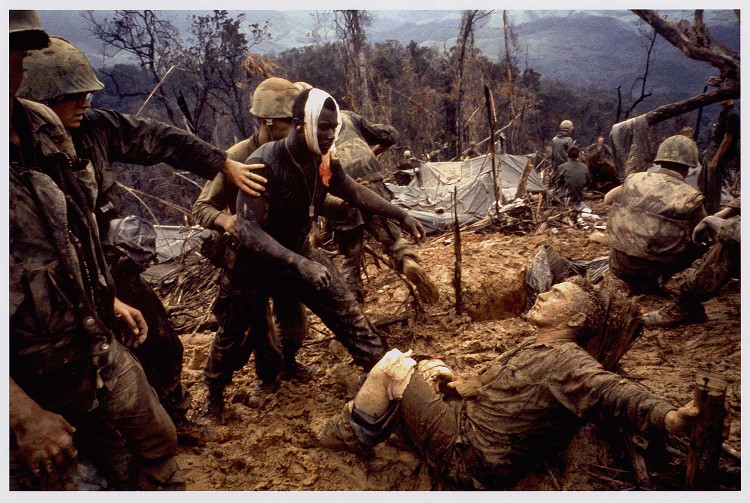 Larry Burrows great photo of Marines on a hilltop in Vietnam.
Larry Burrows great photo of Marines on a hilltop in Vietnam.
Brian Castner disarmed IED’s as a commander of an Explosive Ordinance Disposal Unit in Iraq in 2005-2006. Sometime after he returned, he wrote about it in The Long Walk:
The Long Walk. Armor on, girded with breastplate and helm and leggings and collar. Eighty pounds of mailed Kevlar. No one can put on the bomb suit alone.; your brother has to dress you, overalls pulled up, massive jacket tucked, earnest in his careful thoroughness. One last check, face shield down, and then into the breach, alone.
There is no more direct confrontation of wills between bomber and EOD technician than the Long Walk. Donning the suit, leaving behind rifle and security, to outwit your opponent nose to nose. …
No one takes the Long Walk lightly. Only after every other option is extinguished. Only after robots fail and recourses dwindle. The last choice. Always.
But when the choice comes, … training affords a decisiveness to guide your higher purpose. Castleman went so Keener didn’t have to. So Mengerhausen didn’t have to. … You take the Long Walk for your brother’s wife, your brother’s children, and their children, and the line unborn.
No greater love does one brother have for another than to take the Long Walk.
Jane Goodell served in a Mortuary Unit in Al-Anbar in 2004 and prepared Marine dead for their return home. Sometime after she returned, she wrote about it in Shade It Black:
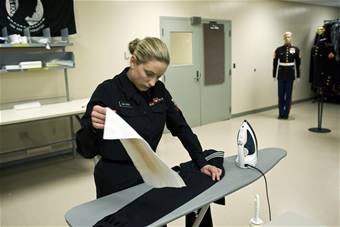 The Sir … gave us step-by-step instructions. “Roll him over to document his wounds.” We may have known that a Marine was hit by bullets or grenade, but we may not have known where. But when we tried to turn him over, we couldn’t. Rigor mortis was setting in, and he was already beginning to stiffen, except for his waist, which was like a pivot point. Even when we strained to turn him over, we could not. It was awkward and we were silent except for the Sir’s slow, calm, firm instructions. … And so eventually we did it. “Okay,” the Sir said, “now write down any distinguishing marks, any tattoos.” So we did. “Now, write down which body parts are missing, and shade the missing parts black on the outline of the body.” So we did.
The Sir … gave us step-by-step instructions. “Roll him over to document his wounds.” We may have known that a Marine was hit by bullets or grenade, but we may not have known where. But when we tried to turn him over, we couldn’t. Rigor mortis was setting in, and he was already beginning to stiffen, except for his waist, which was like a pivot point. Even when we strained to turn him over, we could not. It was awkward and we were silent except for the Sir’s slow, calm, firm instructions. … And so eventually we did it. “Okay,” the Sir said, “now write down any distinguishing marks, any tattoos.” So we did. “Now, write down which body parts are missing, and shade the missing parts black on the outline of the body.” So we did.
“Uniforms for the fallen are always perfect.”
Kevin Powers fought in Mosul and Tal Afar in 2004-2005. Sometime after he returned he wrote this, from the poem Separation:
I want my rifle/and I want them to know/how scared I am still, alone/in bars these three years later when/I notice it is gone.
Marines in Afghanistan
Today, or this week or the next time the moment seems right, ask a vet to tell his or her story. Listen. Be_ Still. Show respect — turn off your phone. Go quiet and listen and try to picture the urgent, feral world that we have never entered. That person has walked there and smelled the air and understood the passions and the costs. Turn off the TV. Turn away from politicians and generals and chicken-hawks and talking heads. Listen to the ones who stepped into the furnace, or those who may stand in its fires even now, right now, or those who wait outside wondering when their turn will come.
*Republican Presidential Hopefuls Intensify Anti-Terrorism Message by Sean Sullivan and Jenna Johnson
Marines in the Korengal Valley, 2004
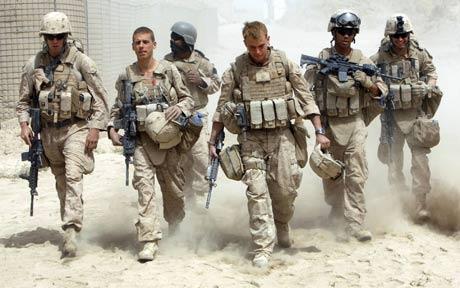
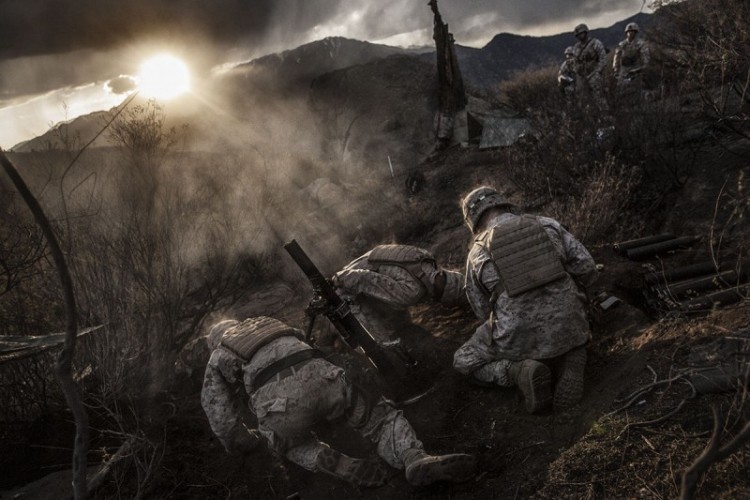
Thanks, Mike for the tribute. So few have done so much. Most of us haven’t a clue. I keep of copy of Tim O’Brien’s “The Things They Carried” near at hand and read it often. Beautiful writing. Scary shit. I try to see the world those soldiers saw, but I will never know what it was like to have to carry the weight they did/do.
Mike,
Good stuff. Thanks